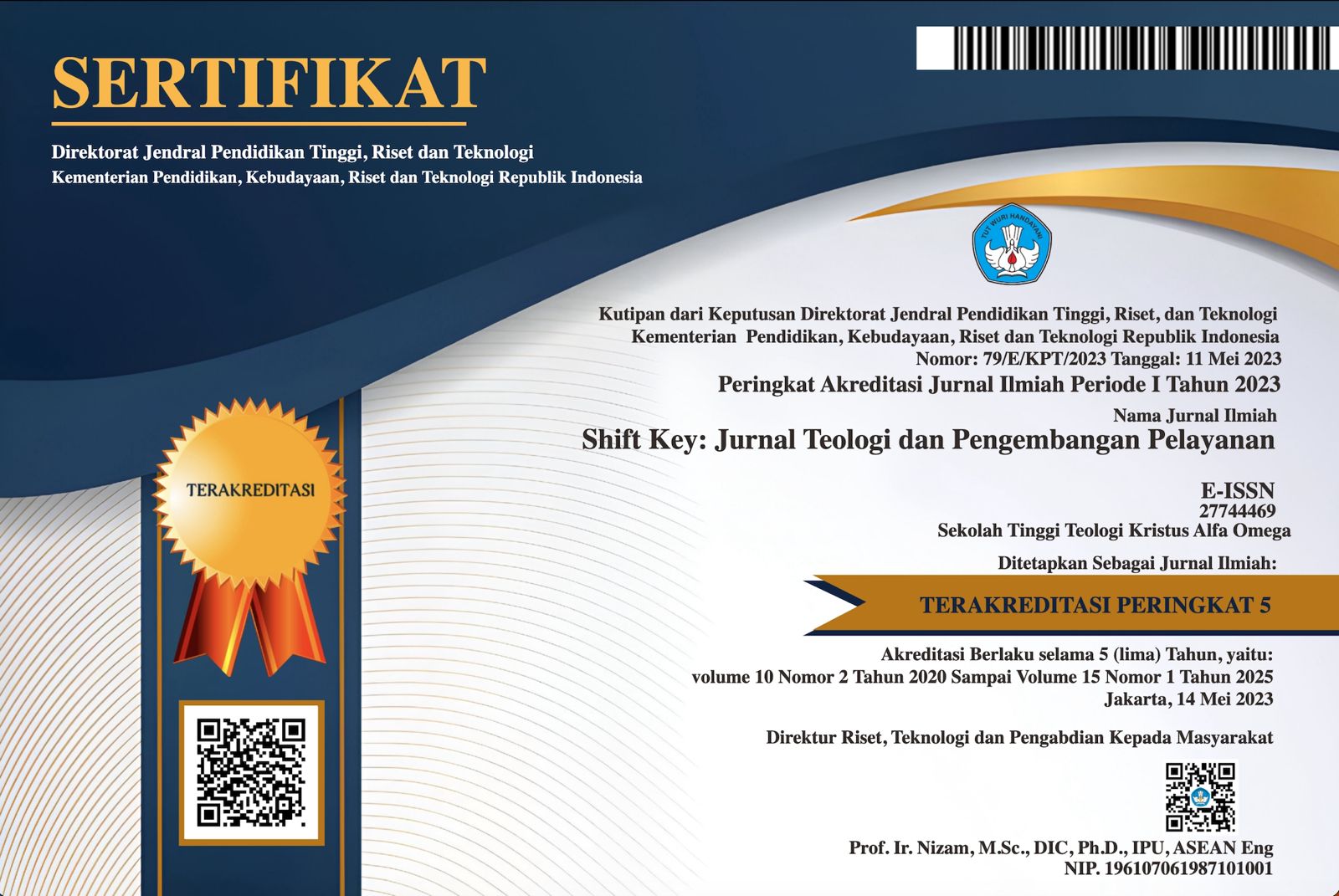Publication Ethics
This journal follows the ethical standards and case-handling procedures established by the Committee on Publication Ethics (COPE). In cases of suspected ethical misconduct by authors, editors, reviewers, or publishers, necessary actions will be taken in accordance with COPE guidelines to preserve the integrity of the scholarly record.
ETHICAL GUIDELINES FOR JOURNAL PUBLICATION
The publication of articles in Shift Key: Jurnal Teologi dan Pengembangan Pelayanan through a double-blind peer review process constitutes an essential element in the development of a coherent and trustworthy body of knowledge. Scholarly publication reflects the quality of the authors' work and the institutions that support them. Each submitted manuscript must be an original work, not previously published in any language, and not under review by another journal. Our journal only publishes manuscripts that fall within the scientific scope described in the Focus and Scope section. Peer-reviewed articles are a tangible manifestation of the scientific method. Therefore, it is crucial for all parties involved in the publication process authors, editors, reviewers, publishers, and the public to agree upon and adhere to expected standards of ethical behavior.
The Research and Community Service Center (P3M) of STT Kristus Alfa Omega, as the publisher of this journal, takes its duties of guardianship over all stages of publishing very seriously and recognizes its ethical responsibilities. The publisher is committed to ensuring that advertising, reprints, or other commercial revenues do not influence editorial decisions. Furthermore, the editorial board will assist in communication with other journals or publishers whenever necessary and beneficial.
Publication Decisions
The editor of Shift Key: Jurnal Teologi dan Pengembangan Pelayanan is responsible for deciding which submitted articles are suitable for publication. The decision must be based on the validity of the research and its relevance to researchers and readers. Editors may consider the policies of the journal's editorial board and must comply with applicable legal requirements regarding defamation, copyright infringement, and plagiarism. Editors may also consult with other editors or reviewers in making such decisions.
Fair Play
Editors must evaluate manuscripts exclusively based on their academic merit, without regard to the authors' race, gender, sexual orientation, religious belief, ethnic origin, citizenship, or political philosophy.
Confidentiality
Editors and any editorial staff must not disclose any information about a submitted manuscript to anyone other than the corresponding author, reviewers, potential reviewers, other editorial advisers, and the publisher, as appropriate.
Disclosure and Conflicts of Interest
Unpublished materials disclosed in a submitted manuscript must not be used in an editor's own research without the explicit written consent of the author. Editors should recuse themselves from handling manuscripts in which they have conflicts of interest resulting from competitive, collaborative, or other relationships or connections with any of the authors, companies, or institutions connected to the papers.
Retraction and Correction Policy
If a significant error or ethical violation is discovered in a published article, the journal will issue a retraction notice, expression of concern, or correction statement in accordance with the COPE Retraction Guidelines. All such actions will be taken transparently and made publicly accessible to maintain the integrity of the scholarly record.
AUTHORS' RESPONSIBILITIES
Reporting Standards
Authors of journal articles must present an accurate account of the work performed and provide an objective discussion of its significance. Authors are required to present honest, precise, objective, and meaningful reports of their research. Data must not be fabricated, falsified, or inappropriately manipulated, and should be presented transparently. The manuscript should contain sufficient detail and references to allow others to replicate the study. Deliberately inaccurate or misleading statements constitute unethical behavior and are unacceptable.
Data Access and Retention
Authors may be asked to provide the raw data related to their manuscript for editorial review and should be prepared to provide public access to such data (in accordance with the ALPSP-STM Statement on Data and Databases) when possible, and to retain such data for a reasonable period after publication. Authors must ensure that their data can be verified by third parties upon request.
Originality and Plagiarism
Authors must ensure that their submitted work is entirely original, and if the authors have used the work or words of others, this must be properly cited or acknowledged. Plagiarism in any form is unethical and unacceptable.
Handling Allegations of Ethical Misconduct
This journal follows the COPE Flowcharts for dealing with suspected publication ethics violations, including plagiarism, data fabrication, or image manipulation. When ethical misconduct is suspected, the editor will initiate an investigation following fair and transparent procedures. Articles may be retracted or corrected if necessary.
Multiple, Redundant, or Concurrent Publication
Authors should not publish manuscripts describing essentially the same research in more than one journal or primary publication. Submitting the same manuscript to more than one journal concurrently constitutes unethical publishing behavior and is unacceptable.
Acknowledgment of Sources
Proper acknowledgment of the work of others must always be given. Authors should cite publications that have influenced the nature of the reported research.
Authorship of the Paper
Authorship should be limited to those who have made a significant contribution to the conception, design, execution, or interpretation of the study. All persons who have made significant contributions should be listed as co-authors. Others who have participated in certain substantive aspects of the research project should be acknowledged or listed as contributors. The corresponding author is responsible for ensuring that all appropriate co-authors are included, that no inappropriate co-authors are listed, and that all co-authors have seen and approved the final version of the manuscript before submission.
Hazards and Human or Animal Subjects
If the work involves the use of hazardous materials, chemicals, procedures, or equipment, the author must clearly identify these in the manuscript. When research involves human or animal subjects, the author must ensure that all procedures comply with relevant institutional and national ethical guidelines and that appropriate approval has been obtained.
Disclosure and Conflicts of Interest
All authors must disclose any financial or other substantive conflicts of interest in their manuscript that could influence the results or interpretation of their work. All sources of financial support for the research should be clearly acknowledged.
Fundamental Errors in Published Works
When an author discovers a significant error or inaccuracy in their own published work, it is the author's obligation to promptly notify the journal editor or publisher and cooperate with the editor to retract or correct the paper.
Appeals and Complaints Procedure
Any appeal or complaint concerning editorial decisions, peer review processes, or the ethical behavior of parties involved may be submitted in writing to the Editor-in-Chief. All complaints will be handled professionally in accordance with COPE guidelines.
Copyright and Licensing Policy
Authors retain copyright of their published articles while granting the journal the right of first publication. Articles are distributed under the Creative Commons Attribution-ShareAlike (CC BY-SA) license, which permits unrestricted use, distribution, and reproduction in any medium, provided the original author and source are properly credited.
EDITORS’ RESPONSIBILITIES
Publication Decisions
Editors are responsible for deciding which articles will be published, based on scholarly merit, originality, clarity, and relevance.
Peer Review Process
Editors must ensure that peer review is fair, impartial, and double-blind. Reviewers must be selected based on their expertise.
Fair Play
Editors must evaluate manuscripts solely on academic merit, without discrimination based on race, gender, religion, or institutional affiliation.
Confidentiality
Editors must keep all information about submitted manuscripts strictly confidential.
Disclosure and Conflicts of Interest
Editors must not use unpublished materials for their own research without the author’s permission and should avoid handling manuscripts where they have conflicts of interest.
Integrity of the Publication Record
Editors must safeguard the integrity of the scholarly record and issue corrections, errata, or retractions when necessary.
REVIEWER'S RESPONSIBILITIES
Contribution to Editorial Decisions
Peer review assists the editor in making editorial decisions, and through editorial communication, it may also help authors improve the quality of their manuscripts.
Timeliness
Any reviewer who feels unqualified to evaluate a manuscript or knows that prompt review will be impossible should immediately notify the editor and withdraw from the review process.
Confidentiality
All manuscripts received for review must be treated as confidential documents. They must not be shown to or discussed with others except as authorized by the editor.
Standards of Objectivity
Reviews should be conducted objectively. Personal criticism of the author is inappropriate. Reviewers should express their views clearly, supported by sound arguments. They should also identify relevant published work that has not been cited by the author.
Acknowledgement of Sources
Reviewers should point out relevant published work that has not been cited by the authors. Any statement that an observation, derivation, or argument has been previously reported should be accompanied by the relevant citation. Reviewers should also inform the editor of any substantial similarity or overlap between the manuscript under consideration and any other published paper or manuscript known to them.
Disclosure and Conflicts of Interest
Privileged information or ideas obtained through peer review must be kept confidential and must not be used for personal advantage. Reviewers should not consider manuscripts in which they have conflicts of interest resulting from competitive, collaborative, or other relationships or connections with any of the authors, companies, or institutions connected to the papers.
PUBLISHER’S RESPONSIBILITIES
Editorial Independence
The publisher ensures that editorial decisions are independent from commercial or political influence.
Integrity of Publications
The publisher supports editors in maintaining the academic integrity of publications, including issuing retractions when ethical violations occur.
Transparency
The publisher must ensure that publication policies, editorial processes, publication fees, and access are clearly disclosed.
Misconduct Prevention
The publisher provides plagiarism detection tools (e.g., Turnitin/iThenticate) and upholds ethical standards in accordance with international guidelines.
Access and Archiving
The publisher guarantees long-term digital archiving (LOCKSS/PKP PLN) and ensures open access availability according to the journal’s policy.





